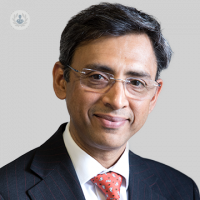Pancreatic cancer: symptoms, risk factors and possible treatments
Written in association with:Pancreatic cancer, although a rare form of cancer, is the fifth biggest cancer killer in the UK alone, and fourth in the western world. This is because the symptoms do not show themselves until the cancer has progressed, often affecting parts of the body beyond the pancreas itself. Once this occurs, surgery is no longer a viable option despite being the most effective treatment for pancreatic cancer. Individuals should therefore watch out for early signs of pancreatic cancer symptoms in order to increase their chance of survival.

Pancreatic cancer symptoms
Symptoms of pancreatic cancer to look out for are:
- Persistent, upper abdominal discomfort
- Back pain
- Sudden loss of weight
- Jaundice (yellow tinge of the eyes and skin, with dark urine, pale stools, often with itching)
Although there are other, less deadly conditions that can cause these symptoms, it is recommended that the individual see a doctor as soon as possible.
Reducing the risk factors for pancreatic cancer
If one wishes to reduce the risk of cancer, it is always advised to avoid smoking, excess drinking, and obesity. Some individuals are naturally more at risk of developing cancer of the pancreas. Anybody with hereditary pancreatitis, chronic pancreatitis, or a family history of cancer, may benefit from regular screening under GP supervision.
Pancreatic cancer screening and treatment
Unlike other cancers, there is no favourable biomarker for pancreatic cancer. In other words, there is no test that demonstrates with clarity that somebody has this form of cancer. Having a reliable biomarker enabling earlier diagnosis could revolutionise treatment of pancreatic cancer.
That said, there has been encouraging progress over the past decade with regard to the treatment and screening of pancreatic cancer with advances in technology playing a major role. Patients are identified sooner due to the greater ease of access to scanning facilities with CT, MRI or ultrasound. Surgery is now more skilled and precise and surgical results have improved greatly. Although a large percentage of patients may still experience cancer recurrence, drug trials with chemotherapy are generating promising results which is a further step in the right direction.


